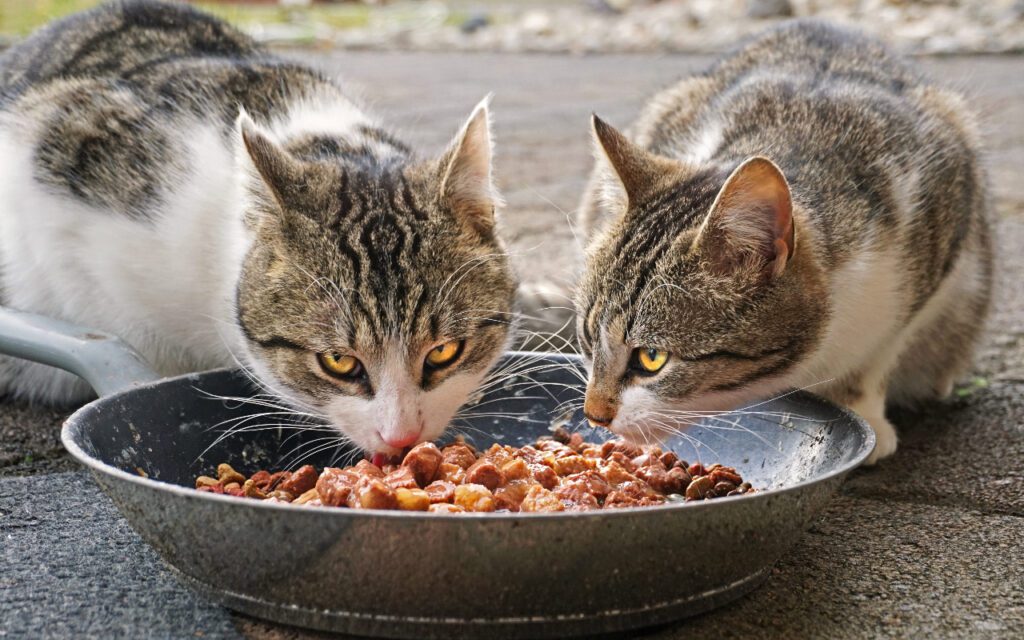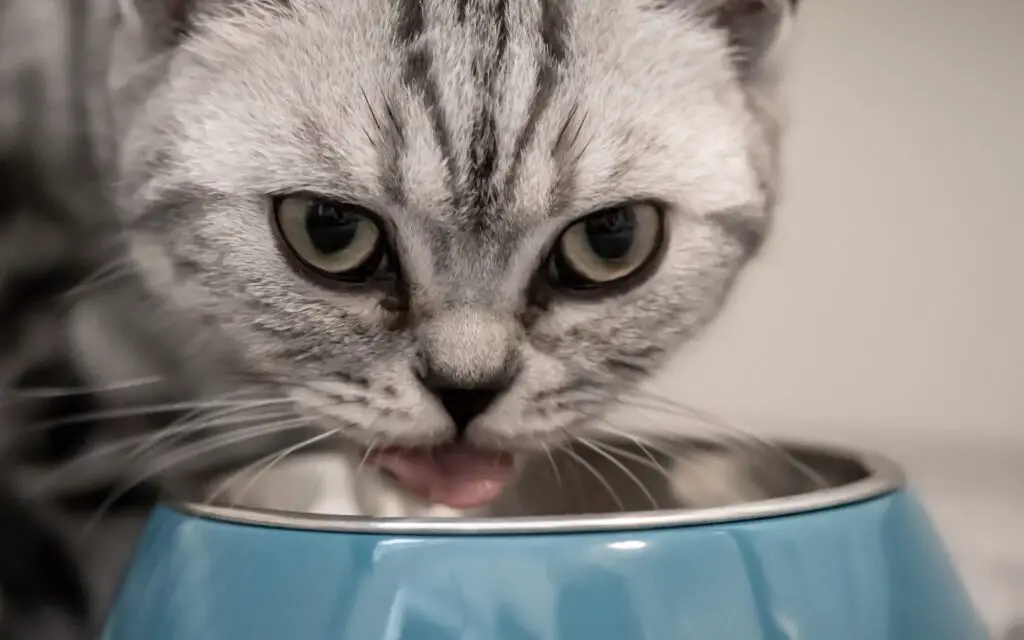Cats can sometimes exhibit puzzling behavior, which may leave their owners scratching their heads.
One such behavior is when they continuously cry for wet food, despite having a bowl full of dry food.
This might seem like a simple case of feline fussiness, but there could be more to it.
It could be linked to their dietary preferences, health issues, or even behavioral patterns.
- Key Takeaway
- Why Does My Cat Keep Crying For Wet Food But Has Dry Food?
- How Do I Get My Cat To Stop Crying For Wet Food?
- Is It Normal For My Cat To Beg For Food All The Time?
- How Do You Control a Cat’s Hunger?
- FAQs
- Q: Is it normal for cats to whine for food?
- Q: What can I do if my cat is always hungry?
- Q: Why does my cat ignore its dry food and beg for food?
- Q: Is it okay to always feed my cat wet food?
- Q: How can I help my cat stop begging for food?
- Q: Why does my cat always seem hungry even after eating?
- Q: How can I stop my cat from whining for food between feedings?
- Q: Should I leave food available for my cat at all times?
- Q: What if my cat only wants wet food in the morning?
- In Conclusion
Key Takeaway
- Your cat may be crying for wet food despite having dry food because wet food is often more palatable, tastier, more nutritious and helps in hydrating the cat.
- To get your cat to stop crying for wet food, you can train it by only feeding when it’s quiet, setting up a designated feeding area, and introducing food puzzles or treats to distract it while ensuring not to positively or negatively reward their crying.
Why Does My Cat Keep Crying For Wet Food But Has Dry Food?

- Cats often prefer the taste and texture of wet food, which closely mimics their natural diet.
- Wet food helps in keeping cats hydrated due to its high water content.
- Persistent demands for wet food could indicate health problems, such as dental issues or conditions like hyperthyroidism or diabetes.
- Cats can learn that crying leads to receiving wet food, thus exhibiting this behavior consistently.
Preference for Taste and Texture
Cats often show a preference for wet food because it more closely mimics the texture and taste of their natural diet, which consists mainly of small prey such as mice and birds. Wet food also tends to be more flavorful and aromatic than dry food, which can make it more appealing to fussy eaters.
Hydration Needs
Wet food has a high water content, usually around 70-80%, which can help keep cats hydrated. This is particularly important because cats have a naturally low thirst drive and may not drink enough water on their own. By eating wet food, they can take in much of the water they need through their diet.
Health Issues
If your cat is crying for wet food despite having dry food, it could be a sign of health problems. Dental issues can make chewing dry food painful, leading your cat to prefer softer, wet food. Conditions like hyperthyroidism or diabetes could also increase your cat’s appetite, causing them to demand more food.
Learned Behavior
Cats are smart animals and can quickly learn that certain behaviors, like crying, will get them what they want. If your cat has learned that crying leads to receiving wet food, they’re likely to continue this behavior. It’s important to be consistent and not reinforce demanding behavior, but also consider their preferences and health needs when choosing their diet.
How Do I Get My Cat To Stop Crying For Wet Food?

- Understand your cat’s needs and preferences for wet food.
- Check for health issues with a vet to ensure the crying isn’t due to a medical problem.
- Create a consistent feeding schedule to manage your cat’s food demands.
- Gradually transition from wet to dry food by mixing them together and increasing dry food proportion over time.
- Avoid reinforcing the crying behavior by not giving in to their demands outside of scheduled feeding times.
- Consult a pet behaviorist or vet if the issue persists or the transition is challenging.
Is It Normal For My Cat To Beg For Food All The Time?
Yes, it can be normal for cats to beg for food. Cats may beg for a variety of reasons including habit, boredom, or actual hunger.
However, if your cat is persistently begging for food, it could indicate an issue such as a nutritionally imbalanced diet, food allergies, or gum disease.
Indoor cats that lack stimulation may also resort to begging for food.
Cats may also associate eating with love and thus want to share the experience, or they might feel vulnerable while eating and seek your company.
It’s important to address these potential issues and consult with a professional if your cat’s begging behavior persists.
How Do You Control a Cat’s Hunger?
Controlling a cat’s hunger can be managed by breaking the meals into smaller, more frequent feedings, which can help satisfy their hunger throughout the day.
Using an automatic feeder can also ensure that your cat receives the right amount of food at the correct times.
Quality of food is essential, and offering your cat good quality food can make a significant difference.
If your cat tends to eat too quickly and regurgitate, you can try slowing them down by spreading their food out on a flat surface or using food puzzles or a food-dispensing toy to increase their activity.
Additionally, adding water to wet food or tricking your cat with chicken stock or dried tuna flakes can help manage their hunger.
Always ensure your cat has a nutritionally balanced diet to keep them healthy and satisfied.
FAQs
Q: Is it normal for cats to whine for food?
A: Yes, it is quite common for cats to meow or whine for food. Cats may do this for a variety of reasons. Some cats may simply be hungry and want to be fed.
Others may have learned that meowing gets them attention from their owners and this reinforces the behavior. It is important to remember not to ignore your cat completely when it is meowing for food, as it may be trying to communicate its needs to you.
Q: What can I do if my cat is always hungry?
A: If your cat always seems hungry, there are a few steps you can take to address this issue. Firstly, make sure that you are providing the appropriate amount of food for your cat’s age, size, and activity level. You may need to adjust the portion sizes or consult with a veterinarian to determine the correct feeding amount.
Additionally, try to establish a consistent feeding schedule so that your cat learns when to expect its meals. Providing mental stimulation and playtime can also help to curb your cat’s constant hunger. If you are still concerned about your cat’s constant hunger, it is best to consult with a veterinarian to rule out any underlying medical issues.
Q: Why does my cat ignore its dry food and beg for food?
A: There are several reasons why your cat may be begging for food and ignoring its dry food. Cats may be picky about their food and may prefer the taste and texture of wet food over dry food. Additionally, cats can become bored with their food if they are fed the same thing every day.
It is also possible that your cat has learned that begging for food gets them attention or extra treats, which reinforces the behavior. If your cat is consistently ignoring its dry food and begging for other types of food, you may want to try offering a variety of high-quality cat foods to ensure that your cat is getting a balanced diet.
Q: Is it okay to always feed my cat wet food?
A: While wet food can provide additional moisture in your cat’s diet, it is not necessary to feed them exclusively wet food. Dry cat food is formulated to meet the nutritional needs of cats and can be a convenient option.
However, if your cat prefers wet food or has specific health issues that require moist food, it is perfectly fine to feed them wet food. The key is to ensure that your cat is receiving a balanced diet that meets their dietary requirements.
Q: How can I help my cat stop begging for food?
A: If your cat is constantly begging for food, there are a few strategies you can try to help curb this behavior. Firstly, avoid reinforcing the begging behavior by not giving in to their demands. Instead, provide regular and consistent meal times for your cat, and stick to a feeding schedule.
Engage your cat in playtime and provide mental stimulation to distract them from their hunger. If the begging behavior continues, consult with a veterinarian to rule out any medical issues or seek advice from a professional animal behaviorist.
Q: Why does my cat always seem hungry even after eating?
A: There could be several reasons why your cat always seems hungry even after eating. One possible reason is that your cat is not eating enough at each mealtime. Cats have relatively small stomachs, so they may need more frequent, smaller meals throughout the day.
Additionally, some cats have higher metabolisms or are more active, which may contribute to their increased hunger. Finally, certain medical conditions such as hyperthyroidism can cause increased appetite in cats. If you are concerned about your cat’s constant hunger, consult with a veterinarian to determine the best course of action.
Q: How can I stop my cat from whining for food between feedings?
A: If your cat is constantly whining for food between feedings, there are a few things you can try. Firstly, ensure that you are providing enough food for your cat’s daily caloric needs. If your cat is consistently hungry, you may need to adjust the portion sizes or consult with a veterinarian for guidance.
Establishing a consistent feeding schedule can also help to reduce your cat’s desire for food between meals. Finally, providing mental stimulation and engaging your cat in playtime can distract them from their hunger and keep them occupied.
Q: Should I leave food available for my cat at all times?
A: Leaving food available for your cat at all times is known as free feeding. While this may work for some cats, it can lead to weight issues and overeating in others. It is generally recommended to establish a feeding schedule and provide measured portions of food for your cat.
This allows you to have more control over their diet and ensures that they are receiving the appropriate amount of food for their needs. Consult with a veterinarian to determine the best feeding method for your individual cat.
Q: What if my cat only wants wet food in the morning?
A: If your cat prefers wet food in the morning, you can try feeding a small portion of wet food and leaving out a bowl of dry food for the rest of the day.
This allows your cat to enjoy its preferred wet food in the morning while still having access to food throughout the day. It is important to monitor your cat’s eating habits and consult with a veterinarian to ensure that they are maintaining a healthy weight and getting all the necessary nutrients.
In Conclusion
In conclusion, a cat crying for wet food despite having dry food is not just a display of whimsical behavior.
Instead, it’s often a reflection of their preference for the taste and texture of wet food, which tends to be more palatable and nutritious.
It also helps keep them hydrated, protecting against kidney and urinary tract problems.





Leave a Reply